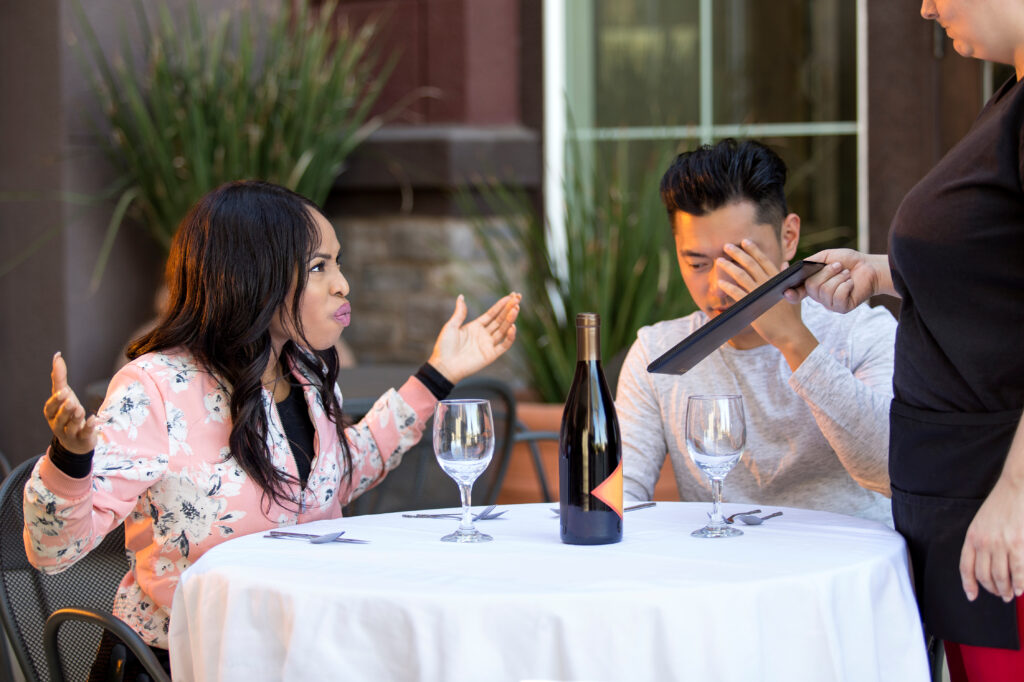If you’re guilty of even one of these, it could be driving people away without you realizing it.

You may think you’re coming across as confident, efficient, or simply busy—but certain everyday behaviors might be silently undermining your relationships. These subtle forms of disrespect often go unnoticed by the person doing them, but they land with a thud on the people around you. And the damage adds up—friendships cool off, colleagues disengage, and loved ones pull away without ever confronting you.
These habits aren’t always intentional, which is why they’re so hard to spot. But once you become aware of them, it’s up to you to make a change. These aren’t just bad manners—they’re signals that you don’t value others. From phone scrolling to chronic lateness, here are 14 shockingly disrespectful things you might be doing without even realizing it.
1. You Interrupt People Like Their Words Don’t Matter

Interrupting someone mid-sentence sends a strong and often hurtful message: what you have to say is more important than what they’re saying. It creates frustration, shuts down open communication, and can make others feel invisible or invalidated. Even if you’re just enthusiastic, cutting people off diminishes their voice and can stifle meaningful dialogue.
Instead of jumping in, try actively listening and giving the speaker space to finish their thought. Let them know they’re being heard. You’ll find that people open up more when they don’t feel like they’re competing to speak, says Alana Valko at BuzzFeed. Respect in conversation builds trust, and thoughtful listening is one of the clearest signs that you value another person’s presence and perspective.
2. You Scroll Through Your Phone When Someone’s Talking to You

Checking your phone while someone is speaking may seem harmless or efficient, but it feels like rejection to the other person. It sends the message that the person in front of you isn’t worth your full attention, and that whatever’s on your screen is more interesting or urgent than the human being trying to connect with you.
This small gesture can completely derail a conversation and leave others feeling unimportant. Being fully present—making eye contact, nodding, and responding thoughtfully—creates a powerful sense of connection, shares Charlotte Hilton Andersen at Reader’s Digest. In a world where attention is currency, offering someone your undivided focus is one of the most respectful things you can do.
3. You Always One-Up Someone Else’s Story

When someone shares something meaningful—a success, a challenge, or even a funny experience—it’s their moment. Constantly redirecting the spotlight with your own bigger, better, or more dramatic story steals their joy and minimizes their voice, states Sean Kernan at Medium.com. It may not be intentional, but it can feel like a competition rather than a conversation.
People want to feel celebrated, not compared. Let their story breathe. Ask questions, show curiosity, and be enthusiastic for their experience. By resisting the urge to one-up, you build stronger bonds and show that you genuinely care about what someone else is going through without needing to shift the attention back to yourself.
4. You Never Say “Thank You” for the Little Things

Gratitude shouldn’t be reserved for grand gestures. It’s the daily niceties—the quick favors, kind words, shared responsibilities—that build a sense of mutual respect. When you fail to acknowledge these small things, people can begin to feel overlooked and taken for granted, even if that’s not your intention.
Thanking someone doesn’t just recognize the act—it recognizes the person. A simple “thank you” has the power to affirm someone’s effort and create a warm, respectful connection. The more you express appreciation for the little things, the more goodwill and trust you create in your relationships.
5. You Cut People Off in Traffic Without a Second Thought

On the road, your actions don’t just affect cars—they affect people. We often forget that the person we just swerved in front of is a real human being who might be late for work, dealing with stress, or simply trying to get home safely. Driving aggressively or selfishly is a subtle but clear message: “My time matters more than yours.”
Respect on the road shows up in small but powerful ways—signaling, allowing space, and being patient. When you drive with consideration, you’re acknowledging the shared experience we all have in getting through the day. Courtesy doesn’t slow you down—it builds a safer, kinder environment for everyone.
6. You Leave a Mess for Someone Else to Clean Up

Leaving behind your trash, dishes, or clutter shifts responsibility onto someone else without their consent. It might seem minor, especially if it’s “just this once,” but over time, it creates resentment. It says you expect others to manage the consequences of your actions, which is both lazy and disrespectful.
Being mindful of your mess is about more than cleanliness—it’s about acknowledging the shared space and labor of others. Whether in a relationship, a workplace, or a coffee shop, cleaning up after yourself shows that you value the people who live and work around you. It’s a quiet act of dignity and respect.
7. You Cancel Plans at the Last Minute (or Don’t Show Up at All)

Life gets unpredictable—emergencies and changes happen. But if canceling plans last-minute becomes a pattern, it signals to others that their time isn’t valuable to you. It’s not just a schedule change; it’s a breach of trust and commitment. Repeatedly flaking out can hurt relationships more than you think.
If you can’t follow through, communicate clearly and as early as possible. An honest explanation and a genuine apology can soften the blow. Show that you respect the time and energy someone invested in making plans with you. Consistency builds connection, and reliability is one of the strongest signs of respect.
8. You Take Forever to Respond to Messages—If You Respond at All

Everyone’s busy, but consistently ignoring texts, emails, or voicemails sends a message that you don’t care. It may not be intentional, but the silence can feel like rejection or dismissal. It tells people they’re not worth a few seconds of your time, and that can quietly chip away at your relationships.
You don’t have to write a novel or reply instantly. A brief acknowledgment—“Got this, will respond soon!”—shows that you’re thoughtful and engaged. Responding in a timely manner keeps connections alive and shows that the relationship matters to you, even during hectic days. Small acts of communication go a long way.
9. You Gossip About People Behind Their Backs

Gossiping might seem like harmless venting, but it’s often a form of betrayal. When you talk negatively about someone who isn’t present, you’re not just sharing opinions—you’re undermining trust. Even the people you’re talking to may start to wonder what you say about them when they’re not around.
Instead, choose integrity. Speak positively, and if you have an issue with someone, go directly to them. Supportive conversations build relationships; destructive ones fracture them. Gossip damages your credibility and sows suspicion. Respect is about standing up for people even when they aren’t in the room.
10. You Take Credit for Other People’s Work

Whether it’s a colleague’s contribution or a friend’s idea, taking credit for something you didn’t do breaks down trust fast. It communicates that you’re more interested in personal gain than in fairness or collaboration. Over time, people stop wanting to work with or support someone who doesn’t give credit where it’s due.
Acknowledging others doesn’t lessen your value—in fact, it often elevates your character. Give praise generously and recognize when someone’s effort helped you succeed. People remember how you made them feel, and sharing credit shows leadership, humility, and genuine respect for the people around you.
11. You Ignore Invitations or Requests Without Responding

Leaving someone on “read” or never replying to a party invite, meeting request, or thoughtful message might feel like a passive act—but it carries real weight. It suggests that you can’t be bothered, or worse, that the person isn’t even worth a reply. It’s dismissive and disrespectful, even if unintentional.
Even if the answer is no, saying something shows you care. A simple “Thanks for thinking of me” or “I won’t be able to make it, but I appreciate the invite” can turn a cold shoulder into a warm connection. Responding shows you value the relationship enough to communicate openly and directly.
12. You Treat Waitstaff and Service Workers Like They’re Beneath You

How you treat people in service roles reveals a lot about your true character. Being rude, dismissive, or entitled toward someone just doing their job is deeply disrespectful. It implies that you believe you’re more important—and that belief creates a toxic ripple effect in every interaction.
Kindness and courtesy are free. Saying “please,” making eye contact, and expressing thanks shows that you recognize someone’s effort. No one wants to be treated like background noise. Respect means treating everyone with dignity, no matter their role. It’s not just about being polite—it’s about being decent.
13. You Show Up Late Like Everyone Else’s Time Doesn’t Matter

Chronic lateness does more than inconvenience others—it communicates that you prioritize your own schedule over theirs. People might smile and say “no worries,” but inside, they’re frustrated. Being late forces others to wait, rearrange, or waste their own time, and it wears on even the strongest relationships.
Making punctuality a priority shows that you care. Leave early, set reminders, and respect the clock. Even when delays happen, a quick heads-up lets others know you’re thinking of them. Being on time isn’t just courteous—it’s a tangible way to demonstrate reliability, self-awareness, and mutual respect.
14. You Constantly Correct People Like You’re the Authority on Everything

Correcting someone over trivial mistakes or small misstatements doesn’t make you look smart—it makes you look superior. It may be meant helpfully, but it can easily come across as dismissive, controlling, or condescending. Over time, people start to feel like they have to walk on eggshells around you.
Letting go of the need to be right builds trust. Unless the correction truly matters, it’s often better to let it slide. People appreciate grace far more than precision. When you prioritize connection over correction, you create safer, more open spaces for communication and genuine relationship-building.
